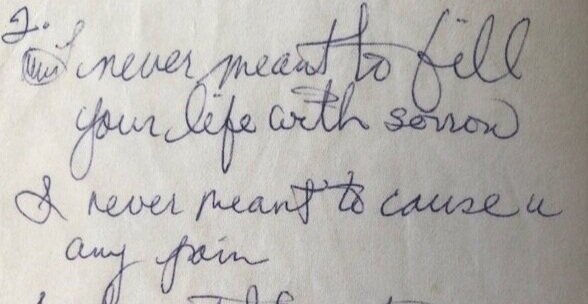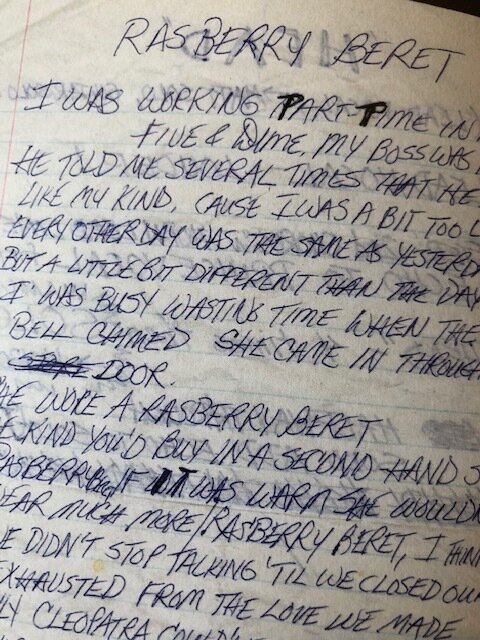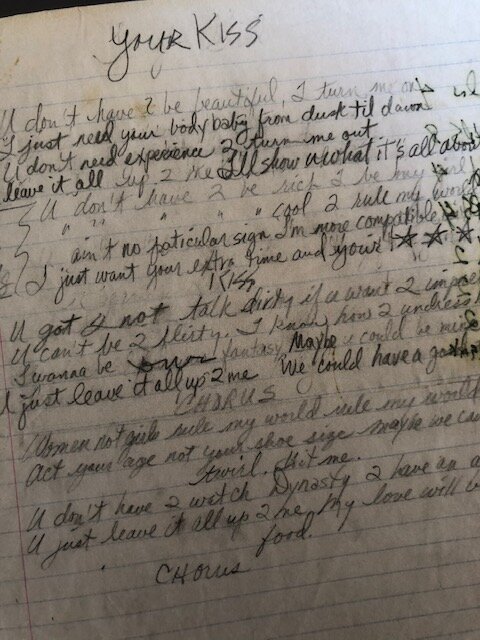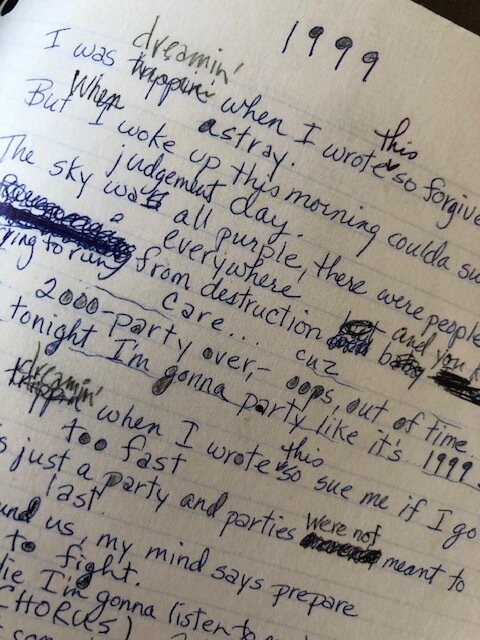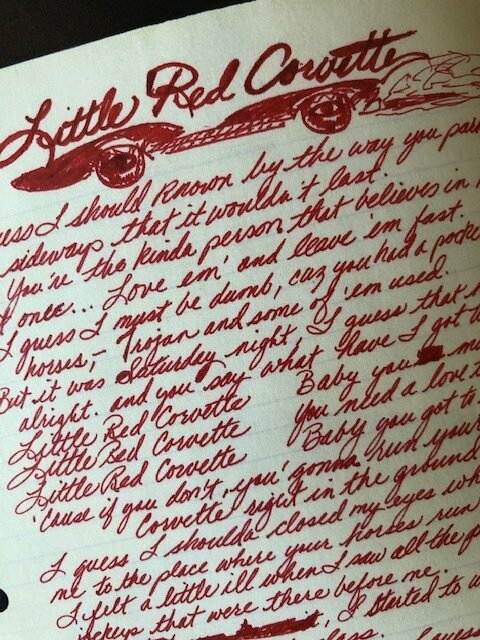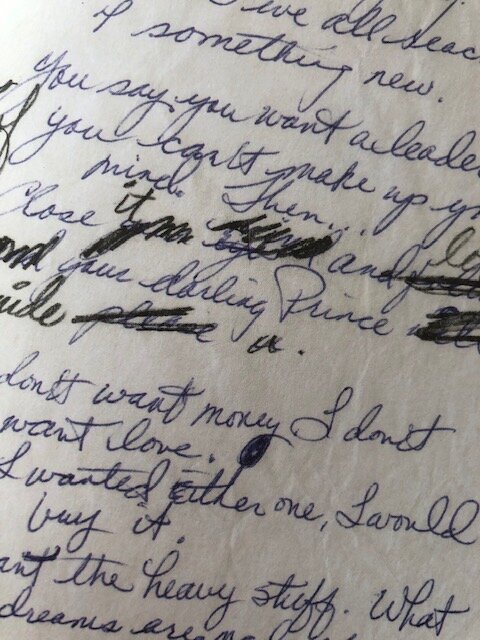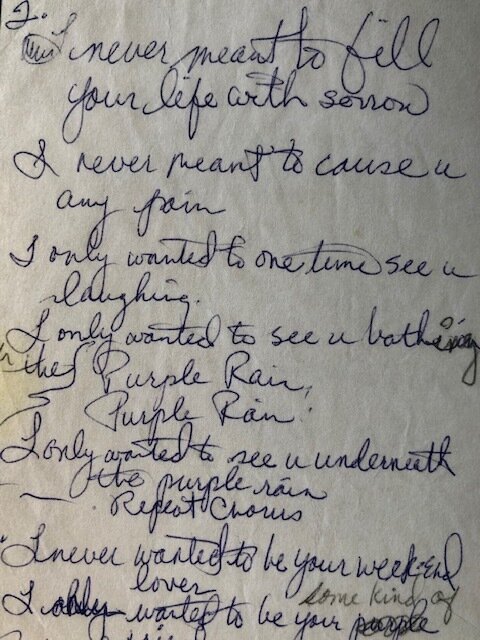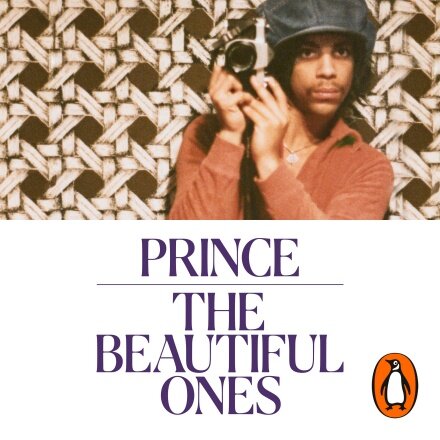Prince: Song as Word
“Handwriting is a lost art in need of resurrection.” —Prince, The Beautiful Ones
As a teenager, Prince earned a bit of money as a babysitter—but not as babysitter to just any family. As babysitter for a local celebrity DJ, Jerry “Motormouth” Mac, he could spend “countless hours” surrounded by the newest records, glossy photos of RnB stars and instruments of all types. As Prince recounts in his memoir, The Beautiful Ones, Jerry introduced Prince to Dee of Dee’s Record Shop where he could head towards on his bike and pick up the latest record: “A trip 2 Dee’s was a Happy Day.”
In “Song as Word,” we take a look at how Prince devoured the musical sounds of his youth, followed by images of early drafts of his written lyrics. To set the stage, play “Musicology” and imagine Prince as the boy taking apart the sounds and living the beat.
Musicology
To make a new sound, it helps to know what you love, what moves you — and this means having a sense of the past. As a teenager, Prince took apart the sounds of his beloved songs as a way of absorbing what he loved to eventually make it his own.
He studied the lyrics and the arrangement:
“Any song that caught my fancy was 1st purchased then transcribed. Lyrics only, as eye never learned 2 read music. Re-copying a lyric helps U 2 break down a line 2 c what it’s made [of] ‘If U feel like loving me, if U’ve got the notion, eye Second That Emotion.’ Then while reading the copied lyric eye’d learn the chords that went with each lyric, as the record played behind me. Eye learned 2 play & sing along with every record of choice. It didn’t matter whether it was male or female—it was the overall arrangement eye was most interested in.”
He carried the sounds, singing it, feeling it in the mouth:
“Singing along with all records—James Brown, Ray Charles, Smokey Robinson, & Aretha Franklin—helps 2 develop range & a sense of soul that can cover all bases. There r many great singers but [not] that many funky singers. How a word is shaped in the mouth & the velocity or subtlety that a word is sung [with] is what characterizes a funky singer or not.”
And eventually, he made the committed step to writing his own:
“Once I got out of high school it was interesting for a while because I didn't have any money, I didn’t have any school and I didn’t have any dependents, I didn’t have any kids, or girlfriends, or anything. I had cut myself off totally from everything. And that’s when I really started writing. I was writing like three or four songs a day. And, they were all really long. Which is interesting for me as a writer, because it’s had to just take a thought, and continue it for a long period of time without losing it. And it’s harder for me now to write that it was back then, because there’s so many people around me now.” (Musician, 1983)
Music Master
Picasso is attributed as saying that Inspiration shall find him working. Prince seems to have known this, too. Colleagues attest to his ability to spend long hours in the studio, experimenting with sound. His sound engineer said of him:
“I think Prince was well aware that time matters. He was using this powerful engine, the engine of his creativity, this incredible brain he had coupled with his unparalleled worth ethic. One of those things he knew he had. He knew he had it early in life, so he was going to use it. He was going to run as hard as he could until the energy ran out.”
Prince and time gave us a number of iconic songs both heard and unheard (thousands are said to have remained in his vault, unheard by the public). Below are few of his ruminations and drafts.
Raspberry Beret:
“And I would write music and I would let them go to the studio and just mess around and see what they come up with. And Lisa wrote this harpsichord part that went: [plays opening bars of ‘Raspberry Beret’]. And that’s the whole song, right? (First Piano & A Microphone performance, January 2016)
Your Kiss:
“Prince recorded ‘Kiss”--called ‘Your Kiss’ in this handwritten draft--on April 28, 1985, at Sunset Sound in Los Angeles. He intended to give the song to Mazarati, a band helmed by his longtime friend David ‘Z’ Rivkin and the Revolution’s bassist, Brown Mark; they were working at Sunset Sound at the time, too. After Prince gave them a demo of the song, he was so impressed b their reworking of it that he insisted on having it back--they’d turned it into something funky. The next night, using their version as a foundation, he produced the version released on Parade the following year, which reached #1 on the Billboard Hot 100 chart.”
Additional Resources
This plunge into Prince’s process was always almost there and it was finally brought forth after reading The Beautiful Ones, the memoir/autobiography/biography initiated by Prince and his collaborator Dan Piepenbring just three months prior to his death on April 21, 2016. Piepenbring was left with Prince’s vision of what kind of book he wanted to create together, with 28 pages of handwritten recollections, and eventually, access to artifacts found in Prince’s home at Paisley Park. It is a beautiful book—as a window into Prince “becoming” and as a work of art itself. Read an excerpt from the Introduction to read about the origins of the book. You can read more about how Paisley Park served as a place for process for Prince here.
*Frontispiece
Early draft of “Purple Rain,” © The Beautiful Ones. Piepenbring, Dan, editor. The Beautiful Ones. Century, 2019.




